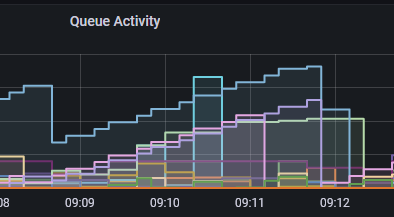There are preferred MQI functions for dealing with message properties. But sometimes you may have requirements for converting between MQRFH2 and properties. This post came out of a question posed by a developer on another IBM product. Oddly, it was the same product (though a different person) that prompted a previous Snippet. And I was able to use the same basic framework from that test to demonstrate how simple it can be.
Continue reading “Snippet 3 – Converting between MQRFH2 and properties”Snippet 2 – Basic MQ Queue Rate monitoring
My previous post was about one small project I got involved with over the last week. This is another one prompted by working with an MQ user, this time to do with metrics. Essentially they had an urgent need to do some basic MQ queue rate monitoring: how many messages were put/got in an interval. More sophisticated observability, whether using a product like Instana, or tools such as these, would be a later exercise. I described what MQ can generate, and what some of the provided sample programs do, but decided it was more interesting to demonstrate it with real running code.
I also think of this as the coding version of the “Yes, And …” rule for Improv. Start with one piece and see where it leads. I ended up with 3 pieces – collect data, format data, display data. Each piece had some utility on its own, but I then thought “Yes, and then what can I do to demonstrate the next phase most effectively.”
Continue reading “Snippet 2 – Basic MQ Queue Rate monitoring”Snippet 1 – Building an MQRFH2
Over the last week I’ve been working on some questions sent to me, and several have resulted in writing some test programs and scripts. This post shows the results of one of those exercises, building an MQRFH2 structure from scratch.
Continue reading “Snippet 1 – Building an MQRFH2”Real audiences
Over the last week, I’ve been working at my first real conference in 2.5 years. SHARE was held in Columbus, Ohio. And we had a full agenda of MQ sessions.
Continue reading “Real audiences”Recording queue manager object access
In this post I’ll talk about a new exit (Installable Service) that can be used with an MQ 9.3 installation for recording queue manager object access requests. It can provide a level of reporting who is using what and when. I’ll show what it does, how it does it, and what the limitations are.
Continue reading “Recording queue manager object access”Durable subscriptions to minimise object handle use
Collection of the metrics that the queue manager publishes requires that each monitored queue has at least one associated subscription. This post describes an interesting option where collection programs use durable subscriptions to minimise object handle use when running MQ monitoring. It reduces the requirements for configuring the MAXHANDS attribute on the queue manager. It’s also a nice demonstration of how subscriptions could be used in any application.
Supporting MQ Jakarta JMS in Spring Boot
One of the features of the newly-released MQ 9.3 is support for JMS 3, also known as Jakarta Messaging. There will be more information elsewhere about what that means for standalone JMS programs. There continues to be a JMS 2 package, of course, for ongoing compatibility. But JMS 3 introduces incompatibilities that mean that we need updated versions of other components to match if you want to move up to newer standards. This post will talk about supporting MQ Jakarta JMS in Spring Boot.
I’ll also discuss the issues I had when developing the new version – the annoying incompatible tooling upgrades I had to work through.
Continue reading “Supporting MQ Jakarta JMS in Spring Boot”MQ application compatibility across a quarter century
I was working on something recently where I had to upgrade various components in the tooling. And I was getting more and more annoyed that the upgrades broke my existing programs and scripts. None of that was MQ’s fault and I’ll write more about the project once it’s available alongside the newly-announced MQ 9.3. [That article is now published here.] But it got me thinking about the efforts we’ve made to keep MQ application compatibility across its lifetime. I wanted to show how we’ve achieved that across a quarter century (and more). And how that has preserved the work that developers have put into their MQ programs. In particular, I want to see if old compiled programs can still work with a current queue manager.
Continue reading “MQ application compatibility across a quarter century”MQ Message Routing in JSON
MQ V6 introduced a tool to help with administration and problem diagnosis in an MQ network. The dspmqrte program shows the route that a message might take, reporting on the transmission queues and channels. It is considered MQ’s equivalent to the TCP/IP traceroute. This post discusses a new variation, dspmqrtj, available on GitHub, that shows MQ message routing in JSON format.
Continue reading “MQ Message Routing in JSON”A obsolete MQ channel option saved the day
After recovering from a site-wide power failure and restart, something then went wrong with my AIX system so that I could no longer log into it. It seemed that the ssh service had died. And none of the other standard Unix services like telnet were enabled for security reasons. I’ll show how I was able to recover, and how an obsolete MQ channel option saved the day.
Continue reading “A obsolete MQ channel option saved the day”


